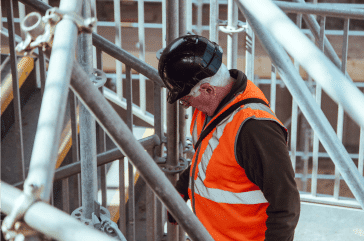When it comes to construction projects, securing the right bonds is essential for safeguarding against potential risks and ensuring a successful outcome. However, the world of construction bonding can be complex, leading to common questions and misunderstandings among business owners and contractors. To help clarify the topic and provide essential insights, Approved Casualty & Surety has addressed the top five frequently asked questions about construction bonds in Canada.
In this informative article, our team of surety experts shares concise information on a range of construction bond-related questions, from the different types of bonds available to the steps required for obtaining them. With our guidance, you can navigate the bonding process with confidence and protect your company’s best interests throughout your construction project endeavors. Equip yourself with the knowledge necessary for success by delving into this valuable resource.
1. What are Construction Bonds and Why are They Important?
Construction bonds, often referred to as contract bonds or contractor bonds, are a type of surety bond that guarantees a contractor’s timely and satisfactory completion of a construction project. They act as a financial guarantee, securing the interests of the project owner (obligee) by ensuring that the contractor (principal) fulfills their contractual obligations according to agreed-upon terms.
There are several reasons why construction bonds are considered essential in the construction industry:
- Protection for the Project Owner: Construction bonds protect project owners against potential financial losses due to contractor failure, delays, or substandard work.
- Assurance of Project Completion: They provide assurance that the project will be completed according to agreed-upon terms and specifications.
- Compliance with Regulations: Construction bonds may be required by law, depending on the project type and location.
2. Different Types of Construction Bonds
There are several types of construction bonds, each serving a specific purpose. Some of the most common ones include:
- Bid Bonds: These bonds guarantee that a contractor, if awarded the project, will enter into a contract with the project owner and provide the required performance and payment bonds.
- Performance Bonds: Performance bonds ensure that a contractor will complete the project according to the contract terms. If the contractor fails to do so, the surety company may step in to complete the project or compensate the project owner for any losses incurred.
- Payment Bonds: These bonds protect subcontractors, suppliers, and laborers by ensuring that they receive payment for their work and materials provided to the project. Payment bonds are usually required alongside performance bonds.
- Maintenance Bonds: Maintenance bonds secure the contractor’s guarantee to repair any defects or malfunctions in the completed work during the warranty period.
3. How to Obtain Construction Bonds in Canada
The process of obtaining construction bonds typically involves the following steps:
- Assess the Type of Bond Required: Start by determining which construction bond(s) you need, based on the project’s requirements and any legal or contractual regulations.
- Pre-Qualification: Before applying for a bond, contractors often undergo a pre-qualification process, where the surety company assesses their financial stability, credit score, work history, and project portfolio.
- Partner with a Reliable Surety Provider: Work with a trusted insurance broker and surety specialist, such as Approved Casualty & Surety, who can help guide you through the bonding process and secure the appropriate bonds for your project.
- Submit the Necessary Documents: Provide the surety company with all required documents, including financial statements, project details, and any prior bond history. The surety company may also request additional information as needed.
- Pay the Premium: Once your bond is approved, you will need to pay the bond premium to the surety provider. The bond premium is usually a percentage of the total bond amount.
4. Factors Affecting Construction Bond Costs
Several factors impact the cost of construction bonds in Canada. Some of these include:
- Contractor’s Credit Score: Contractors with a higher credit score are generally considered less risky and may qualify for lower bond premiums.
- Financial Stability: The contractor’s financial stability can impact bond costs, with more financially stable contractors often receiving favorable rates.
- Project Size and Scope: The size and complexity of the construction project directly influence bond costs, as larger or more complex projects typically have higher bond amounts and premiums.
- Bond Type: Different construction bond types come with varying costs, depending on their purpose and associated risks.
- Surety Provider: The chosen surety provider may offer different rates based on their underwriting criteria and risk assessment.
5. Best Practices for Maintaining Strong Construction Bond Eligibility
Maintaining strong eligibility for construction bonds can help you secure better rates and improve your chances of obtaining bonds for future projects. Consider following these best practices:
- Maintain a Strong Credit Score: Pay your bills on time and minimize your debt load to maintain a favorable credit score, which will reflect positively on your bond applications.
- Keep Accurate Financial Records: Maintain comprehensive, up-to-date financial records, as surety providers use this information to assess your financial stability and risk level.
- Build a Positive Work History: Demonstrate a consistent record of successful project completion and strong references from prior clients and partners. This establishes your credibility and reliability as a contractor.
- Manage Risks Proactively: Implement effective risk management strategies to minimize potential project delays, disputes, or failures.
- Seek Expert Guidance: Engage with a trusted insurance broker and surety specialist like Approved Casualty & Surety, who can provide expert advice and support throughout the bonding process.
By understanding the fundamental aspects of construction bonds and their importance in the Canadian construction landscape, you can confidently navigate the bonding process and enhance your project’s chances of success.
Secure Your Construction Projects with Expert Bonding Support
Understanding construction bonds and their various types is crucial for successfully navigating the Canadian construction landscape. These bonds protect project owners, subcontractors, and contractors, ensuring the timely and satisfactory completion of projects. By following best practices and engaging with a trusted insurance broker and surety specialist like Approved Casualty & Surety, you can maintain strong construction bond eligibility and secure the necessary bonds for your projects with ease.
Don’t leave your construction projects exposed to potential risks – partner with Approved Casualty & Surety to navigate the complex world of construction bonds in Canada confidently. Contact us today to discuss your specific bonding needs and let our team of experts provide you with tailored solutions, unmatched industry insights, and personalized support throughout the bonding process.
Disclaimer: The information provided in this article is intended for illustrative purposes only and should not be considered as actual insurance advice. Our articles offer insights and general guidance on various insurance topics however, they do not substitute professional advice tailored to your specific circumstances. For expert, personalized insurance advice and solutions, please contact our licensed insurance brokers.






